Have we ever wondered what the health benefits of organic fruits and vegetables are?
We live in a world where our food choices significantly impact our overall health and well-being. More people are turning to organic options, particularly fruits and vegetables, as they seek healthier and more sustainable lifestyles. But what makes organic produce so special? Are the benefits substantial enough to warrant the often higher price tag?

Understanding Organic Farming
What is Organic Farming?
Organic farming is a method of agriculture that emphasizes natural products and processes. Synthetic chemicals, such as pesticides and fertilizers, are avoided. Instead, organic farmers rely on techniques like crop rotation, composting, and biological pest control to maintain soil health and control pests naturally.
Certification and Standards
Certified organic produce must meet strict guidelines established by regulatory bodies. For instance, in the United States, the USDA (U.S. Department of Agriculture) oversees organic certification. To bear the USDA Organic label, a product must be produced without the use of most synthetic pesticides and fertilizers, genetic engineering, and irradiation.
| Criteria | Conventional Farming | Organic Farming |
|---|---|---|
| Pesticides | Synthetic pesticides allowed | Only natural pesticides allowed |
| Fertilizers | Synthetic fertilizers allowed | Compost and natural fertilizers |
| GMOs | Genetically modified organisms | No GMOs allowed |
| Farming Techniques | Often monoculture | Crop rotation and polyculture |
Nutritional Advantages of Organic Produce
Increased Nutrient Content
Organic fruits and vegetables are often touted for having higher nutritional value. Studies suggest that organic produce may contain higher levels of certain nutrients, including vitamins, minerals, and antioxidants. These compounds are crucial for our immune system and overall health.
Reduced Exposure to Pesticides
One of the most significant benefits is the reduced exposure to pesticides. Conventional produce often contains residues of synthetic pesticides, which can pose health risks over time. Choosing organic reduces our exposure to these harmful chemicals.
Higher Levels of Antioxidants
Antioxidants like vitamin C, lycopene, and phenolic acids are more abundant in organic produce. These compounds fight oxidative stress in our bodies, potentially decreasing the risk of chronic diseases such as heart disease, diabetes, and cancer.
Environmental Benefits
Aside from personal health advantages, organic farming also offers significant environmental benefits.
Biodiversity
Organic farming practices encourage biodiversity. By avoiding chemical pesticides and fertilizers, organic farms become a sanctuary for various plant and animal species. This biodiversity is crucial for a balanced ecosystem.
Soil Health
Organic methods enhance soil fertility and structure. With techniques like composting and crop rotation, organic farmers promote healthy soil that can sustain crops over the long term without the need for synthetic inputs.
Lower Pollution Levels
Organic farming reduces pollution. Synthetic chemicals used in conventional farming can leach into waterways, harming aquatic life and potentially affecting our drinking water. Organic farming minimizes these risks by eschewing synthetic inputs.
Improving Overall Health
Preventing Chronic Diseases
Consuming organic fruits and vegetables may lower our risk of chronic illnesses. Antioxidants found in higher quantities in organic produce can reduce inflammation and combat free radicals, both of which are linked to chronic conditions like heart disease, diabetes, and cancer.
Supporting a Healthy Digestive System
Organic produce contains fewer pesticides, leading to a healthier gut flora. Pesticides can impact our digestive health negatively by altering the balance of beneficial bacteria in our gastrointestinal tract.
Boosting Mental Health
Eating organic fruits and vegetables might also benefit our mental health. Reduced chemical exposure combined with higher nutritional content can support brain health, potentially lowering the risk of mental health disorders.

Cost Considerations
The Price of Health
One common deterrent for organic products is cost. Organic farming practices are typically more labor-intensive and time-consuming, leading to higher prices at the store. However, many of us find that the benefits, both to our health and the environment, justify the extra expense.
Ways to Save
We can still enjoy organic produce without breaking the bank. Buying in-season produce, shopping at local farmers’ markets, or joining a community-supported agriculture (CSA) program can help us save money while reaping the benefits of organic fruits and vegetables.
Supporting Local and Small Farmers
By purchasing organic produce, we support local and small-scale farmers who practice sustainable farming methods. This support helps sustain local economies and encourages more farmers to adopt organic practices.

Conclusion
The health benefits of organic fruits and vegetables are numerous. From higher nutritional value and reduced pesticide exposure to environmental benefits and support for local farmers, choosing organic can have profound effects on our health and the planet. While the cost may be higher, the long-term benefits for our bodies and the environment make it a worthwhile investment. It’s clear that organic produce offers us a healthier, more sustainable choice for our diets.




